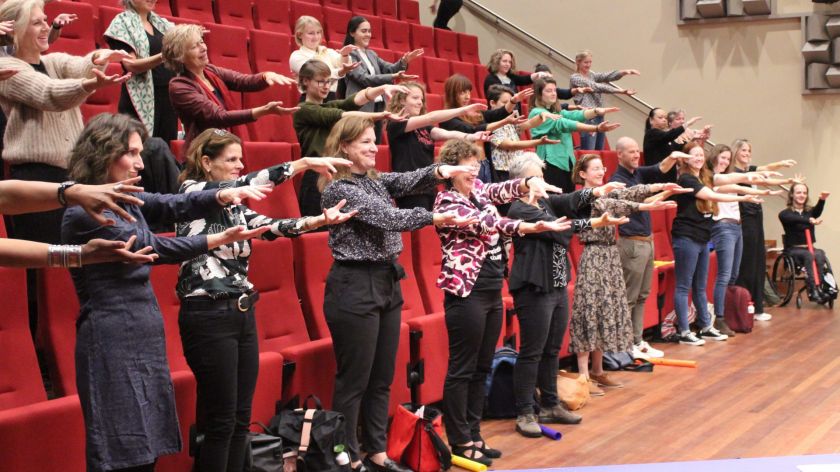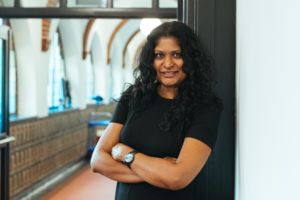Diversity plans aplenty, but they remain invisible
-
 Warming up van het publiek op diversiteitsdag. Foto: Ezme Davis
Warming up van het publiek op diversiteitsdag. Foto: Ezme Davis
Daniël Wigboldus, Chair for the Executive Board, referred to the university’s diversity plans as ‘a train in motion’. He means to say that a lot of talks and discussions regarding diversity and inclusivity have been made into concrete plans, and as ‘the train’ moves, they will see what works and what doesn’t. It is already possible for students and employees to participate in ambassador programmes, theatre workshops and anti-discrimination courses, but lack of visibility remains an issue.
Looking back on the Diversity Day, diversity officer Rona Jualla van Oudenhoven remarks ‘next year’s will be bigger.’ The 4th of October is National Diversity Day, and Radboud University took the chance to reflect on the steps it has taken to promote diversity and inclusivity.
Lately there has been a lot of looking back, but also looking ahead. ‘It is clear what direction we’re heading’, chair Daniël Wigboldus remarked in the Joint Assembly last week. That direction is towards a more inclusive campus. And the train is already on track, according to the chair. But ‘diversity’ remains a very abstract term for many people on campus. What results of the past two years’ worth of diversity plans have students and employees noticed?
Tackling prejudice
Students and employees already have the option to attend courses. The DEI-office (diversity, equity, inclusion), which is headed by Van Oudenhoven, launched an online module called tackling harassment in September. In this course, the participant learns how to handle discrimination and intimidation by learning to recognise certain situations and acting on them.
‘We’re trying to tempt people with free t-shirts’
According to Van Oudenhoven, so far less than a hundred people have signed up for the course. ‘That’s not a lot; this partly due to lack of promotion.’ Besides a short article on the university’s website, students and employees have not been bombarded with advertisements for the course. ‘We’re trying to tempt people with free t-shirts’, according to Van Oudenhoven.
Theatre workshops
Last summer, university- and Radboudumc employees could sign up for a quartet of Unconscious Bias Theatre Workshops, where participants learned how to recognise their own (subconscious) biases. The shows depicted situations based on real incidents in the workplace that were submitted by people from the Radboudumc.
Gijs Bijlstra, professor at the Behavioural Science Institute, is researching whether attending such a workshop truly addresses someone’s preconceptions. ‘We use surveys taken before, directly afterwards, and four months after the show’, he explains. But they have yet to draw any conclusions. ‘We’re in the final stage of research.’
Van Oudenhoven is in talks with several deans at the moment, because she’s working on setting up DEI-committees, or teams, at every faculty. These will play an important role in establishing DEI policy. There are also several DEI ambassadors on campus: students or employees who have completed a programme and ‘created more awareness of (subconscious) biases’, who can then share that knowledge with others.
Criticisms
However, the plans have also been criticised. Inge Bleijenberg, professor of Action Research (with an emphasis on gender and diversity), remarked in the Joint Assembly that several tasks of the various DEI-committees according to the DEI plan overlap with those of existing institutes at the university.
Those tasks would include checking subsidy requests or educational programmes for diversity issues, for example. ‘But it would be much more efficient if the existing education committee or grant committee can look at their own tasks with a more inclusive outlook’, according to Bleijenbergh.
But, as stated by Van Oudenhoven, the intent is not for committees to double their workload. ‘A lot of the faculties themselves made requests for special teams focused on issues of diversity and inclusivity’, she says. ‘One of their tasks is going to be looking into how those other committees can better integrate inclusivity issues.’ Additionally, a separate DEI-team sends a strong message, according to Van Oudenhoven.
‘Inge Bleijenberg was invited to give the keynote speech at the Diversity Day; that shows that we can work together. Now there is some momentum going. Let’s just see if we can get those teams rolling.’
Budgetary issues
Another potential issue is that everything DEI-related is based on volunteers. It is not possible to require attendance, and Van Oudenhoven knows that doing so will often have adverse effects. ‘That leads to resistance. We need to create a culture where everyone embraces DEI.’
Most DEI work is not compensated; the Joint Assembly wanted to know why. ‘In our view, DEI tasks are a part of scientific work in general’, according to Daniël Wigboldus. ‘Just like matters of scientific integrity.’ The Executive Board does not appear to have any concrete plans to pay employees and students for their DEI work – not including members of the DEI office.
The budget is an issue. The 100.000 euros set aside for the DEI office, are a part of the HR budget. If Van Oudenhoven wants to advertise for DEI, she has to so this via the communications department; if she wants to work together with Student Life and International Mobility, she has to ask them for a budget. ‘It would be nice if I had an independent budget’, Van Oudenhoven says. ‘That would allow me improve the reach of DEI interventions.’




